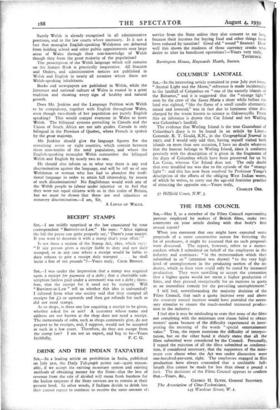RECEIPT STAMPS
SIR,—I am mildly surprised at the law enunciated by your correspondent " Barrister-at-Law." He says: " After signing the bill the payee can quite properly say, ' There's your receipt. If you want to decorate it with a stamp that's your affair.'" Is not there a section of the Stamp Act, 1891, which says : " If any person gives a receipt liable to duty and not duly stamped, or in any case where a receipt would be liable to duty refuses to give a receipt duly stamped . . . he shall incur a fine of ten pounds "?—Yours truly, CECIL BINNEY.
SIR,—I was under the impression that a stamp was required upon a receipt for payment of a debt ; that a charitable sub- scription (unless paid under a covenant) was not a debt ; there- fore, that the receipt for it need not be stamped. Will " Barrister-at-Law " tell us whether this idea is unfounded? I inferred from what one society said that they stamped all receipts for £2 or upwards and then got refunds for such as did not need stamps.
As to shops, is there any law requiring a receipt to be given, whether asked for or not? A customer whose name and address are not known at the shop does not need a receipt. The memoranda of sales, such as shops commonly give, do not purport to be receipts, and, I suppose, would not be accepted as such in a law court. Therefore, do they not escape from the stamp law? I am not an expert, and beg to be—Yours








































 Previous page
Previous page